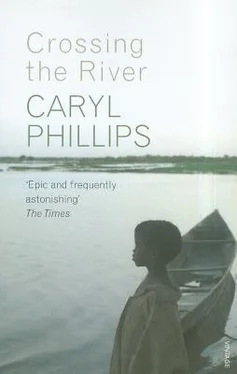Caryl Phillips - Crossing the River
Здесь есть возможность читать онлайн «Caryl Phillips - Crossing the River» весь текст электронной книги совершенно бесплатно (целиком полную версию без сокращений). В некоторых случаях можно слушать аудио, скачать через торрент в формате fb2 и присутствует краткое содержание. Год выпуска: 2006, Издательство: Vintage, Жанр: Современная проза, на английском языке. Описание произведения, (предисловие) а так же отзывы посетителей доступны на портале библиотеки ЛибКат.
- Название:Crossing the River
- Автор:
- Издательство:Vintage
- Жанр:
- Год:2006
- ISBN:нет данных
- Рейтинг книги:4 / 5. Голосов: 1
-
Избранное:Добавить в избранное
- Отзывы:
-
Ваша оценка:
- 80
- 1
- 2
- 3
- 4
- 5
Crossing the River: краткое содержание, описание и аннотация
Предлагаем к чтению аннотацию, описание, краткое содержание или предисловие (зависит от того, что написал сам автор книги «Crossing the River»). Если вы не нашли необходимую информацию о книге — напишите в комментариях, мы постараемся отыскать её.
Crossing the River — читать онлайн бесплатно полную книгу (весь текст) целиком
Ниже представлен текст книги, разбитый по страницам. Система сохранения места последней прочитанной страницы, позволяет с удобством читать онлайн бесплатно книгу «Crossing the River», без необходимости каждый раз заново искать на чём Вы остановились. Поставьте закладку, и сможете в любой момент перейти на страницу, на которой закончили чтение.
Интервал:
Закладка:
By the second decade of emigration, very little had changed. Pioneers still arrived, their innocent faces etched with a passionate desire to do God’s work, but sadly they soon found themselves unable successfully to weather the twelve-month seasoning period, and friends and relatives were called upon to be the messengers of melancholy intelligence to those they had left behind in America. One who arrived in this period, and one of these most determined to survive and pursue the task that he had been prepared for, was Nash Williams. Neither climate nor native confrontation, disease nor hardship of any manner would deflect him from his proper purpose. Word soon reached his former master that on many occasions he had to be prevailed upon in the harshest terms to cease working in the rain in the best interests of his health. On receiving this news Edward Williams felt moved secretly to reach for his pen and address the first of his two letters to his former slave. A portion of this first letter contained the following words of wisdom: Before you left America, I reminded you of the sacrifices that our good Lord Jesus Christ made for us all, and urged you to consider the situation of Christianity in this new country that you inhabit. You were kind enough not only to dwell upon my words, but to convey back to me in the form of a letter information as to the unlettered and heathen state of the masses. For this both my good wife, Amelia, and myself are grateful. Such information will no doubt prove vital to those slaves whom we are now preparing, in order that they might one day join you on the pagan coast. However, I am somewhat dismayed to hear (from a source you will no doubt guess) about your continued insistence upon attempting to carry out tasks, without recourse to aid from other fellows, that would strain five men, both physically and mentally, either Christian or native. Christ’s sacrifices were many, but surely your acquaintance with the Good Book will have revealed to you that they were calculated. Even He could not do everything in one day. You are fortunate in being blessed with a fair mind and strong body and (although I say so myself) doubly fortunate in that your former master was of a progressive persuasion. Do not disappoint me, or yourself, by falling short of the high standards that you have already set yourself. Only yesterday the children gathered about Amelia and asked after your well-being, and then said prayers for you. Our whole experiment depends greatly upon your success. Your resolve may be firm, but we are all flesh and blood. I hope that you understand that I speak to you in order to assist in your development. May I suggest that you study the Good Book for further guidance.
Sadly, this letter was uncovered by Edward’s wife, Amelia, and not conveyed. However, never again did Edward receive intelligence that his former bondsman Nash had either disobeyed his instruction, put himself in unnecessary mortal danger, or done anything that might lead Edward once more to consider reaching for the pen and composing lines of disapproval.
In 1841, having received the letter from his former slave Madison, and having fully digested its discomfiting contents, Edward Williams rose from his chair in the drawing-room and immediately set about making plans to journey to Liberia in order that he might determine for himself what had befallen the virtuous Nash. His plan was to travel alone by the first ship that was sailing for the coast, and he foresaw no reason for there to be a delay of any kind. Being now a widower, he would have to endure neither harsh nor reproachful words from his lady wife, Amelia, who would no doubt have been gravely suspicious of the motives which lay behind his projected expedition. At first, and much to Edward’s surprise, the idea of this scheme did not win the consent of the officials of the American Colonization Society. Though full of admiration for the enthusiasm of Edward Williams, and sympathetic to the ardor he continued to display towards his black charges, they were at pains to point up to him the many dangers to which he might unwittingly be exposing himself. Edward persisted in his communications with them, and eventually, but only after much altercation, they chose to relent their opposition and grant cautious support. At first they had insisted that the mysterious disappearance of a single settler was something they could reasonably expect to occur on a regular basis. Such was the peril of dispatching good men to heathen shores at the edge of civilization, and encouraging them to make this African land their home. But Edward had argued that to abandon men as remarkable as Nash could only reflect adversely on the future of the Society. He reminded the Society that, on his own initiative, he had borne the not inconsiderable expense of sending this man to college in Virginia, in order that he might be thoroughly prepared and trained for the life of a missionary. And further, he had encouraged all of his former slaves, including Nash, to avoid Monrovia, and like wind-driven seeds to scatter themselves about the land in the hope that there might be a widespread distribution of the message of the Lord. Only Nash had heeded his words. He had settled up-river in native country, having taken to his bosom a good Christian wife from Georgia, one Sally Travis, now deceased. Edward reminded the Society that, together with his wife, Nash had operated the most successful of the mission schools for natives. In fact, Edward had reminded them of this fact at every possible juncture, for, according to his closely argued deposition, this was not simply the sacrifice of one missionary, a victim of untreated fever or ill-advised wanderings into the interior. Edward was adamant that the disappearance of Nash could signal a humiliating defeat for the Society’s ideals as a whole, and he was determined to reach the territory of Liberia and investigate matters with his own eyes. Finally, the American Colonization Society, having listened with patience, came to realize that indeed there was more virtue in assisting Edward Williams than in impeding him.
It was customary at this time to set sail from Virginia or New York, but Edward had determined to leave on the first available ship, irrespective of its port of departure. He spread before himself a map of the known world, and stared at the inelegant shape of Africa, which stood like a dark, immovable shadow between his own beloved America and the exotic spectacle of India and the countries and islands of the Orient. He would travel for an undetermined length of time, although he had been led to believe that twenty-eight days was not at all unusual for such a journey. Fortunately, he was already armed with some knowledge of what rigors he might reasonably expect to face, both on the passage and after arrival, through the evidence of those letters from his former slaves which Amelia had permitted him to peruse. They spoke of problems and difficulties which would inevitably tax the health of a man of Edward’s fragile constitution, but common sense and restraint would be his guides.
Born in 1780, the son of a wealthy tobacco planter, Edward had inherited his father’s estate in his twenty-ninth year, and with it the sum total of three hundred slaves. A rich man of unrivalled wealth, he could simply have luxuriated himself and slipped quietly into a premature retirement, but he also inherited from his father an aversion to the system which had allowed his fortunes to multiply. Edward soon took the unusual initiative of encouraging his slaves to acquire the generally forbidden arts of reading and writing. When, some years after his windfall of slaves, he became aware of the formation of the American Colonization Society, this seemed an ideal opportunity to divest himself of the burden, or at least some part of the burden, of being a slave-owner, a title which ran contrary to his Christian beliefs. His wife, though initially not sharing fully in his unusually philanthropic fervor, had slowly come to tolerate the strange behavior and desires of her husband. But, sadly, she was no more. And now the chief player in his game, the most successful of his Christian blacks, was lost somewhere on the dismal coastline of Africa. Day and night a troubled Edward mused over Nash. Had that dark face, charged with belief and propriety, been somehow changed in the humid and barbarous climate? He could not believe that Africa could have distorted Nash’s faith, and encouraged him to turn his back on his God. And why now, after all these years of patience, had he suddenly chosen to break off with his former master? This troubling conundrum, which each night kept Edward awake and tossing first this way and then that, threatened to tear apart his very soul. He knew that he had little choice but to travel to Liberia, not simply to discover the truth surrounding the fate of his Nash, but in order to confirm that his life’s work, and more importantly his own life, had been of some worth.
Читать дальшеИнтервал:
Закладка:
Похожие книги на «Crossing the River»
Представляем Вашему вниманию похожие книги на «Crossing the River» списком для выбора. Мы отобрали схожую по названию и смыслу литературу в надежде предоставить читателям больше вариантов отыскать новые, интересные, ещё непрочитанные произведения.
Обсуждение, отзывы о книге «Crossing the River» и просто собственные мнения читателей. Оставьте ваши комментарии, напишите, что Вы думаете о произведении, его смысле или главных героях. Укажите что конкретно понравилось, а что нет, и почему Вы так считаете.












